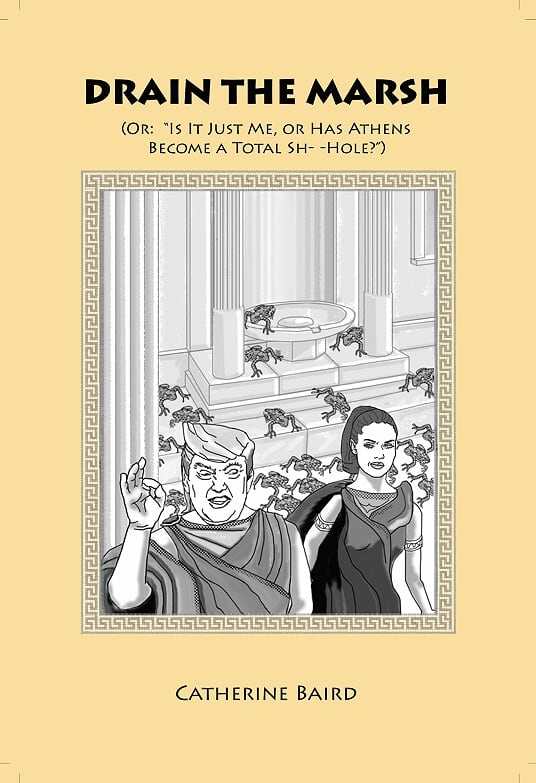
Drain the Marsh
(Or: "Is It Just Me, or Has Athens Become a Total Sh- - Hole?")
Drain the Marsh mixes historical and current events with healthy dollops of fantasy for a modern and timely political satire.
A playwright and a demagogue stumble along their chosen career paths in Catherine Baird’s historical comedy Drain the Marsh.
Aristophanes, once a successful playwright, is in a bind. He is flat broke, no one will produce his plays, and the subjects of his satirical works keep beating him up. Meanwhile, Cleon, an unscrupulous businessman, has gotten himself elected General of Athens without meaning to win, and his campaign promises threaten to destroy the city. Cleon’s antics seem like the perfect basis for a new, fortune-making play—if Aristophanes can work up the nerve to antagonize the pettiest, most powerful man in Athens.
Set in Athens in 424 BCE, the story injects current events into its historical setting for an effective, if disheartening, demonstration of how little people have changed since ancient times. The main plot is an outrageous series of fictitious events that build to a memorable conclusion. Scenes of overt satire are balanced by quiet, humanizing moments between Aristophanes and his friends. A romantic subplot between Aristophanes and Lysistrata, Cleon’s former mistress, is sweet but less involving than Cleon’s scheming. Aristophanes’s thoughts regarding the teenage Thalia are uncomfortable by modern standards, and crude and explicit humor plays in. A few jokes run too long.
Inconsistent characterizations are a point of confusion, and the book’s exaggerated accents are difficult to read. Quotes from contemporary politicians are integrated, and while some fit the scenes they are a part of, others are inserted for their own sake, rather than to further the conversation. At times, the plot is rushed and relies too much on summary.
The book’s wordplay and ruthless mockery of recognizable personalities, from Donald Trump to Socrates, play off of the characters’ well-known foibles and faults to great and humorous effect. A scene in which a policeman interrogates Covfefe, a Persian stooge, about a robbery is especially fun.
The world of ancient Athens comes to life because of the text’s intimate, painstaking details, from the beautiful artwork of the Athenian marketplace to the increasing unpleasantness of the Dionysian Marsh. Scenes of ancient Greek celebrations, including the all-important Dionysia festival, add a grounding base to the often wild story.
The book’s final section, in which multiple subplots reach their climax at once, is as fitting and suspenseful as it is clever. Historical notes and quote attributions are helpful, explaining which story elements are true, which are not, and the ultimate fates of the historical characters.
Drain the Marsh mixes historical and current events with healthy dollops of fantasy for a modern and timely political satire.
Reviewed by
Eileen Gonzalez
Disclosure: This article is not an endorsement, but a review. The publisher of this book provided free copies of the book and paid a small fee to have their book reviewed by a professional reviewer. Foreword Reviews and Clarion Reviews make no guarantee that the publisher will receive a positive review. Foreword Magazine, Inc. is disclosing this in accordance with the Federal Trade Commission’s 16 CFR, Part 255.
